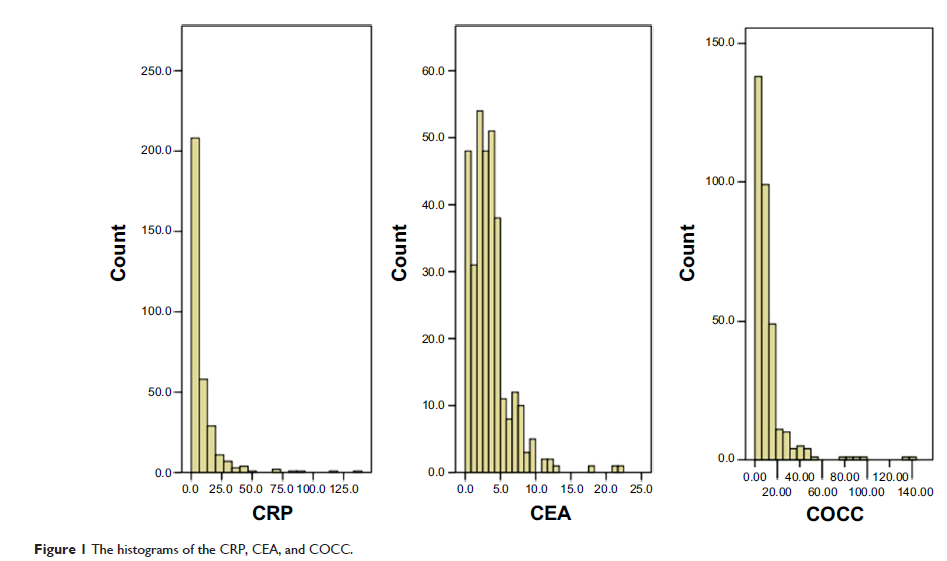109669
论文已发表
注册即可获取德孚的最新动态
IF 收录期刊
- 3.4 Breast Cancer (Dove Med Press)
- 3.2 Clin Epidemiol
- 2.6 Cancer Manag Res
- 2.9 Infect Drug Resist
- 3.7 Clin Interv Aging
- 5.1 Drug Des Dev Ther
- 3.1 Int J Chronic Obstr
- 6.6 Int J Nanomed
- 2.6 Int J Women's Health
- 2.9 Neuropsych Dis Treat
- 2.8 OncoTargets Ther
- 2.0 Patient Prefer Adher
- 2.2 Ther Clin Risk Manag
- 2.5 J Pain Res
- 3.0 Diabet Metab Synd Ob
- 3.2 Psychol Res Behav Ma
- 3.4 Nat Sci Sleep
- 1.8 Pharmgenomics Pers Med
- 2.0 Risk Manag Healthc Policy
- 4.1 J Inflamm Res
- 2.0 Int J Gen Med
- 3.4 J Hepatocell Carcinoma
- 3.0 J Asthma Allergy
- 2.2 Clin Cosmet Investig Dermatol
- 2.4 J Multidiscip Healthc

已发表论文
术前血清 C 反应蛋白和癌胚抗原的结合是对食管鳞状细胞癌患者有益的一个预后因素:一项综合的 ROC 分析
Authors Huang Y, Liu JS, Feng JF
Published Date April 2015 Volume 2015:8 Pages 795—803
DOI http://dx.doi.org/10.2147/OTT.S77378
Received 12 November 2014, Accepted 19 January 2015, Published 10 April 2015
Background: The prognostic value of inflammatory index in esophageal cancer (EC)
has not been established. In the present study, therefore, we initially
evaluated a novel prognostic system, named the COCC (COmbination of C-reactive
protein [CRP] and carcinoembryonic antigen [CEA]), for making a prognosis in
patients with esophageal squamous cell carcinoma (ESCC).
Methods: A total of 327 patients with ESCC between January 2006 and December 2008 were included in this retrospective study. The COCC was calculated by combined CRP and CEA according to the logistic equation. The Kaplan–Meier method was used to calculate the cancer-specific survival (CSS), and the difference was assessed by the log-rank test. Cox regression analyses were performed to evaluate the prognostic factors.
Results: In our study, COCC was defined as CRP +0.71 CEA according to the logistic equation. Receiver operating characteristic curves for CSS prediction were plotted to verify the optimum cutoff points for CRP, CEA, and COCC, which were 9.8 mg/L, 4.2 ng/mL, and 8.0, respectively. Patients with COCC ≤8.0 had a significantly better CSS than patients with COCC >8.0 (53.1% vs 15.3%, P <0.001). Multivariate analysis revealed that COCC was an independent prognostic factor in patients with ESCC (P =0.006). In addition, the area under the curve (AUC) was 0.722 for COCC, 0.645 for CRP, and 0.618 for CEA, indicating that COCC was superior to CRP or CEA for CSS prediction.
Conclusion: The COCC is an independent prognostic factor in patients with ESCC. We conclude that COCC was superior to CRP or CEA as a more precise prognostic factor in patients with ESCC.
Keywords: esophageal squamous cell carcinoma, C-reactive protein, carcinoembryonic antigen, cancer-specific survival, prognosis
Methods: A total of 327 patients with ESCC between January 2006 and December 2008 were included in this retrospective study. The COCC was calculated by combined CRP and CEA according to the logistic equation. The Kaplan–Meier method was used to calculate the cancer-specific survival (CSS), and the difference was assessed by the log-rank test. Cox regression analyses were performed to evaluate the prognostic factors.
Results: In our study, COCC was defined as CRP +0.71 CEA according to the logistic equation. Receiver operating characteristic curves for CSS prediction were plotted to verify the optimum cutoff points for CRP, CEA, and COCC, which were 9.8 mg/L, 4.2 ng/mL, and 8.0, respectively. Patients with COCC ≤8.0 had a significantly better CSS than patients with COCC >8.0 (53.1% vs 15.3%, P <0.001). Multivariate analysis revealed that COCC was an independent prognostic factor in patients with ESCC (P =0.006). In addition, the area under the curve (AUC) was 0.722 for COCC, 0.645 for CRP, and 0.618 for CEA, indicating that COCC was superior to CRP or CEA for CSS prediction.
Conclusion: The COCC is an independent prognostic factor in patients with ESCC. We conclude that COCC was superior to CRP or CEA as a more precise prognostic factor in patients with ESCC.
Keywords: esophageal squamous cell carcinoma, C-reactive protein, carcinoembryonic antigen, cancer-specific survival, prognosis
